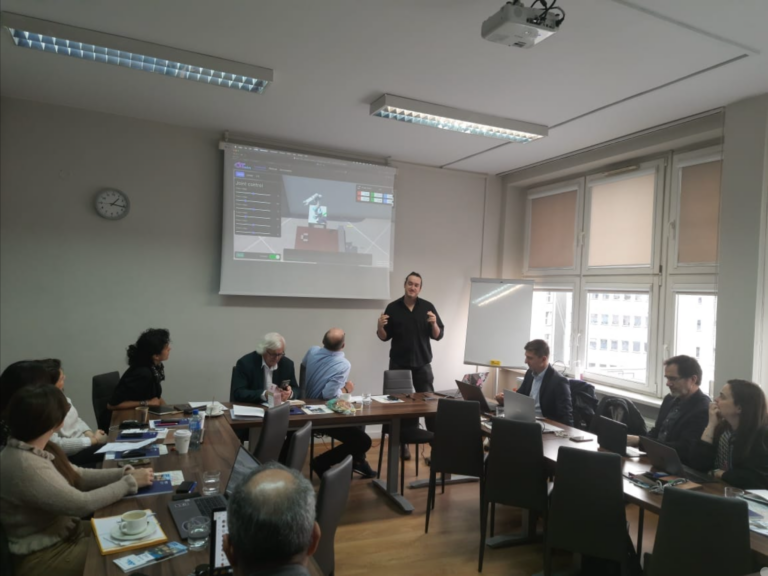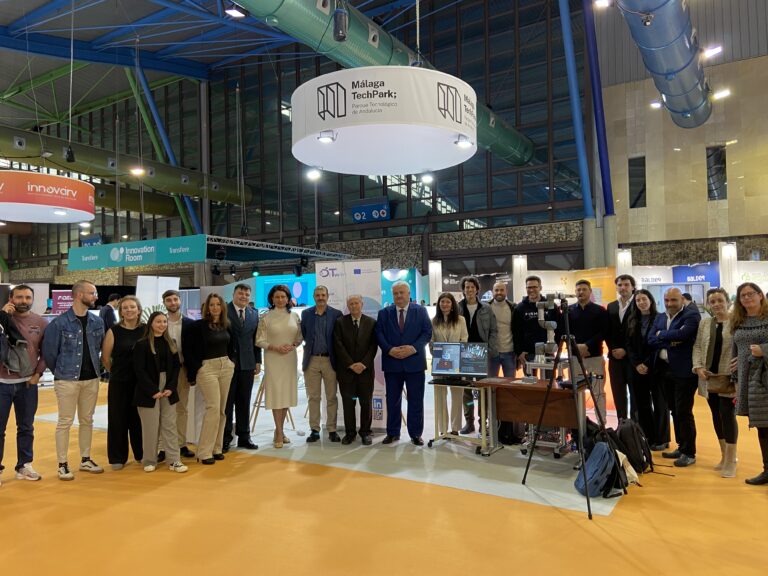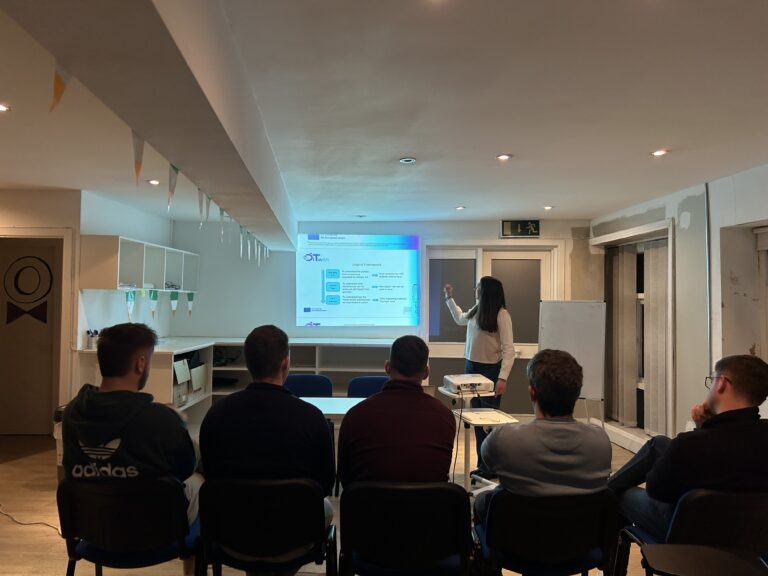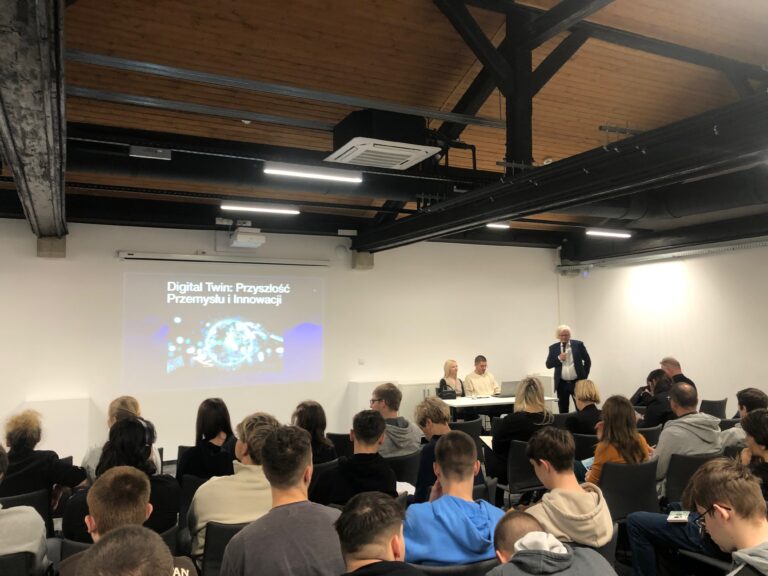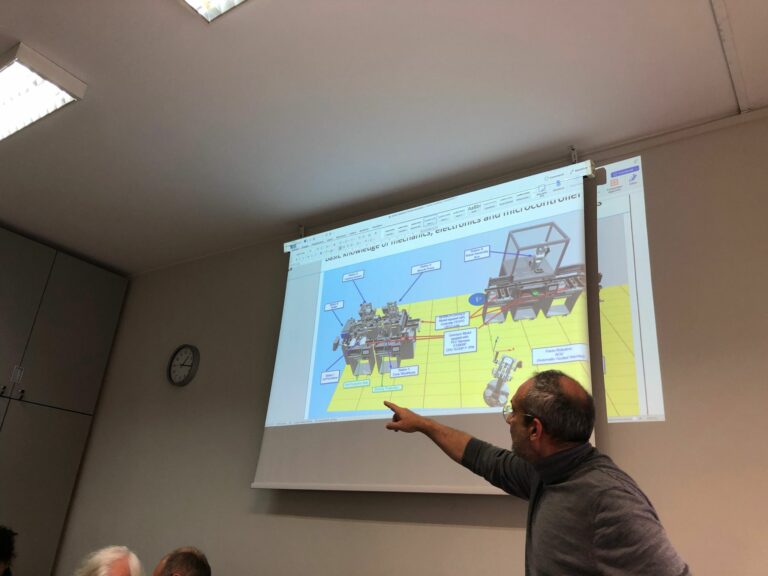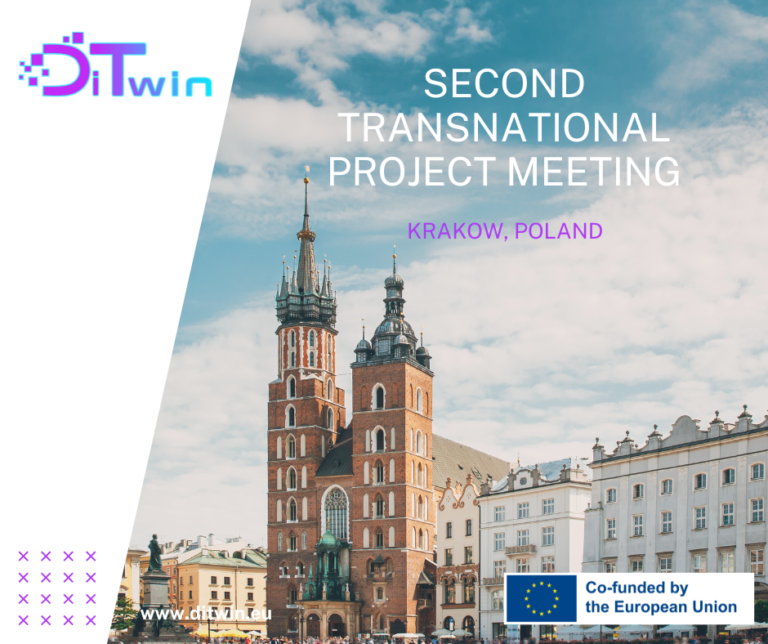Digital Twin for VET schools
Projekt
DiTwin – Digital Twin for VET schools to dwuletni projekt partnerski w sektorze kształcenia i szkolenia zawodowego (KA220-VET) finansowany w ramach programu Erasmus+.
Głównym celem projektu jest poprawa skuteczności programów nauczania VET w celu osiągnięcia kompetencji wymaganych przez Przemysł 4.0. Projekt ma na celu wypełnienie luki w wyposażeniu szkół zawodowych poprzez wykorzystanie potencjału technologii Digital Twin.
Technologia Digital Twin umożliwia działania edukacyjne oparte na pracy, dobrze dostosowane do ostatniego rozwoju przemysłu wytwórczego. Pomoże to w dostosowaniu programów nauczania VET i oferty szkoleniowej dostawców VET do rzeczywistych potrzeb w zakresie umiejętności i zapewni nowe podejście edukacyjne.
Projekt umożliwi szkołom, które nie mają dostępu do zaawansowanych narzędzi, maszyn i laboratoriów, wdrożenie praktycznego i doświadczalnego uczenia się w celu osiągnięcia kompetencji wymaganych przez Przemysł 4.0.
Projekt poprawi również kompetencje cyfrowe nauczycieli VET, aby wspierać wdrażanie działań opartych na cyfrowych bliźniakach i osiąganie umiejętności cyfrowych wymaganych przez przemysł 4.0.
Rezultaty

Moduły DiTwin
Cyfrowe bliźniaki dla studentów VET mające na celu rozwijanie kompetencji potrzebnych w
Przemyśle 4.0.

Platforma DiTwin
Bezpłatna platforma internetowa umożliwiająca nauczycielom i uczniom dostęp i korzystanie z modułów
modułów DiTwin w szkole.

Podręcznik DiTwin
Zapewnia nauczycielom i trenerom kształcenia i szkolenia zawodowego, narzędzia i zasoby edukacyjne do skutecznego wdrażania,
wspierania, zarządzania i oceniania działań opartych na cyfrowych bliźniakach.

Międzynarodowy kurs szkoleniowy DiTwin
Międzynarodowy kurs szkoleniowy dla nauczycieli kształcenia i szkolenia zawodowego mający na celu rozwijanie niezbędnych kompetencji technicznych i pedagogicznych do wdrażania i zarządzania działaniami opartymi na cyfrowych bliźniakach w szkołach.

Wideo samouczek DiTwin
Jest to prosty przewodnik dla nauczycieli VET na temat wdrażania modułów DiTwin w klasie.

DiTwin Demo Event
To warsztat online prezentujący platformę DiTwin i jej zastosowanie.
Aktualności
DiTwin Project Update: New Developments in Digital Twin Implementation and Training
After months of intense collaboration between partners, the DiTwin project is reaching a crucial milestone. The collective efforts invested so far have laid a solid foundation, allowing the project to consolidate the results achieved and take another decisive step towards its final goal. By harnessing the potential of Digital Twin technology, DiTwin is shaping new educational methodologies that bridge the gap between innovation and practical application in the vocational education and training (VET) sector. The focus over the coming months will shift to implementing the DiTwin modules. This phase is a unique opportunity for participants to apply Digital Twin technology in real-world scenarios and explore its technical and pedagogical potential. The implementation will provide valuable insights into how this innovative approach can enhance experiential learning, making education more immersive, dynamic, and aligned with the evolving needs of Industry 4.0. In addition, the partnership is working on the implementation of WP3, „DiTwin Backpack”, a dedicated initiative designed to support teachers in acquiring the knowledge, skills, and competences needed to implement, lead, and evaluate practical and experiential learning through Digital Twin-based activities. These are the main activities foreseen by WP3: With these key activities, the DiTwin project is not only advancing in its technological implementation but also fostering a strong community of educators ready to embrace the future of digital learning. As the project moves forward, the partnership remains committed to ensuring that Digital Twin technology becomes an accessible and practical tool for teachers and learners alike, driving innovation in education across Europe. Stay tuned for more updates!
Read MoreDiTwin Multiplier Event showcased in Málaga during Transfiere 2025
On Wednesday, March 12, the Spanish Multiplier Event of the European DiTwin project took place in Málaga, during Transfiere 2025 — the largest European forum for R&D and innovation in Southern Europe — which gathered more than 4,500 professionals from over 1,500 companies and institutions. The event, organized by Málaga TechPark and the University of Málaga, brought together 50 participants, mainly VET teachers, headmasters, academic lecturers, and representatives of international organizations. The session began with presentations by Sonia Palomo (Málaga TechPark) and Víctor Muñoz (University of Málaga), who introduced the DiTwin project and highlighted its role in fostering digital innovation in vocational education and training. Attendees also had the opportunity to take part in a hands-on demonstration at the Málaga TechPark stand, where they explored the robot developed by the University of Málaga as part of the project and experienced first-hand how Digital Twin technology can be integrated into teaching environments. DiTwin’s presence at such a large international innovation event reinforced its position as a reference initiative for the digital transformation of education and helped strengthen connections with industry and education stakeholders. The insights and contacts gathered during the event will contribute to further refining the DiTwin modules and supporting their adoption in vocational training across Europe. The Project continues to move forward in its mission to equip teachers and students with the digital skills required by Industry 4.0.
Read MoreFocus Groups Across All Partner Countries
In January 2025, focus groups meetings for the European DiTwin project took place across all participatingcountries (Ireland, Spain, Italy, Poland, and Greece). The focus groups followed a shared approach in every country. The sessions, held both in-person and online, brought together VET teachers, technology specialists, and industry representatives and focused on threemain topics: 1. The challenges of aligning VET education with labor market demands and Industry 4.0. 2. The support teachers need to integrate Digital Twin technology into their lessons. 3. The review and improvement of the DiTwin Handbook. The DiTwin project, funded by Erasmus+, aims to introduce Digital Twins into vocational education and training (VET). The meetings with teachers and experts helped identify key needs and refine the DiTwin Handbook, which is a crucial guide for implementing this technology in schools. These discussions provided valuable insights that will help tailor the project’s resources to meet the real needs of teachers. Main Challenges Identified 1. Mismatch between VET Curricula and Industry 4.0: Across all countries, the inflexibility of thecurricula was seen as a barrier to introducing new technologies. In Spain, teachers suggested addingDigital Twin modules during flexible training hours and adjusting practical activities to better alignwith Industry 4.0. In Italy, a lack of collaboration between schools and small to medium-sizedbusinesses (SMEs) was mentioned, as many SMEs struggle to provide the resources needed for partnerships with educational institutions.Strengthening ties between education and industry was emphasized as vital to ensuring that training better matches market needs. In Ireland, teachers pointed out that lessons are mostly theoretical and do not always reflect what industries actually need. There was also concern about the lack of technological training for educators, which limits theuse of innovative tools like Digital Twins. 2. A DiTwin Handbook that meets teachers’ needs: Everyone agreed that the DiTwin Handbookshould offer a simple, clear introduction to Digital Twins and how they can be used in teaching. In Spain, teachers suggested the manual should explain how this technology improves efficiency and predictive maintenance in industry, helping students better prepare for their careers. In Italy, teachers recommended including practical examples of how Digital Twins are used with ManufacturingExecution Systems (MES) to monitor processes in real-time and spot problems. In Ireland, the proposal was to include examples from local industries, ready-to-use modules, practical guides, and accessible software tools, ideally open-source or low-cost. In conclusion, the focus groups for the DiTwin project have been key in identifying what teachers need and improving educational resources. The next step is to update the DiTwin Handbook based on the feedback received and organize teacher training sessions. With this initiative, Digital Twins will become an essential tool in preparing vocational students for the digital skills the future job market will demand.
Read MoreExploring the Future of Education: DiTwin Project Brings Digital Twin Technology to Vocational Schools
On Tuesday, 10 December 2024, the DiTwin project hosted a multiplier event at the stunning Museum of Engineering and Technology in Kraków. The event was attended by 23 vocational school teachers, representatives of foundations, NGOs, specialist vocational education institutions, and 49 vocational school students. The meeting’s agenda included a presentation by second-year journalism students from UKEN, who introduced the concept of Digital Twin technology. Dr. hab. Krzysztof Gurba, a professor at UKEN, also delivered a presentation outlining the DiTwin project’s concept, assumptions, expected outcomes, and current progress. At the conclusion of the event, participants had the opportunity to network and engage with project contributors. The first presentation, focused on explaining what Digital Twin technology is, was delivered by second-year journalism students from UKEN: Kinga Tokarczyk and Mikołaj Kawa. During their talk, they defined a Digital Twin as „a virtual copy of a real object, system, or process.” The students further elaborated on the applications of Digital Twin technology in various fields: They also highlighted the benefits of Digital Twin technology, which include: However, they also acknowledged the challenges associated with its implementation: Dr. hab. Krzysztof Gurba, Prof. UKEN, delivered the second presentation, focusing on the DiTwin project’s relevance to vocational education. He explained how Digital Twin technology can revolutionize education. Prof. Gurba emphasized that the project aims to prepare young people for the challenges of Industry 4.0 and 5.0 by leveraging modern technologies as educational tools. He highlighted the international collaboration behind the project, which includes partners such as Learnable (Italy), Digital Smart (Italy), Innovation Frontiers (Greece), Training Vision (Ireland), Malaga TechPark (Spain), Universidad de Malaga (Spain), and the University of the National Education Commission in Kraków (Poland). The project’s outputs include: Prof. Gurba explained that the project focuses on three key areas: 3D printing, robotics, and process automation. The platform developed as part of the project will offer: To conclude, Prof. Gurba announced upcoming pilot tests and a demonstration event for the system. He invited teachers, institutional partners, foundations, and training organizations to collaborate in developing the teacher handbook. He also announced a focus study scheduled for January 2025.
Read MoreHighlights from the Second DiTwin Transnational Project Meeting
The second transnational meeting of the DiTwin project was held on November 14–15, 2024, in Krakow. During the event, project partners reviewed progress, discussed achievements, and laid the groundwork for future advancements in technical training powered by Digital Twins. Progress Achieved Significant milestones have been reached, including: 1. Competence Framework: Finalized, outlining key roles and skills required for Industry 4.0. 2. Specialized Training Modules: Developed for three critical professional profiles: – Additive Manufacturing Technician – Robot Machines Technician – Automation Technician for Industry 4.0 The meeting included practical demonstrations showcasing the use of Digital Twins to simulate industrial machinery and integrate them with real-world devices. The DiTwin Modules The primary goal of the DiTwin modules is to equip students with the skills necessary to thrive in Industry 4.0 using Digital Twins, digital replicas of physical systems connected to educational laboratories. This innovative approach provides an immersive and hands-on learning experience. Target Professional Profiles The training pathways are tailored to meet the demands of three key roles: – Additive Manufacturing Technician: Specializing in 3D printing technologies and additive design. – Automation Technician: Focused on industrial automation and machine programming. – Robot Machines Technician: Proficient in robotics programming and maintenance. Key Features of the DiTwin Approach – Simulation-Based Training: Allowing students to practice safely in virtual environments. – Digital-Physical Integration: Connecting virtual and real machines to provide practical, hands-on training. This educational approach creates a synergy between theory and practice, preparing future technicians to meet the challenges of an increasingly digitalized and interconnected industrial world.
Read MoreDiTwin second Transnational Project Meeting
The second transnational project meeting will be held in Krakow (Poland) on 14-15 October 2024, hosted by the UNIWERSYTET PEDAGOGICZNY IM KOMISJI EDUKACJI NARODOWEJ W KRAKOWIE. All project partners (Learnable – IT, Digital Smart Srl – IT, PARQUE TECNOLOGICO DE ANDALUCIA – ES, UNIVERSIDAD DE MALAGA – ES, UNIWERSYTET PEDAGOGICZNY IM KOMISJI EDUKACJI NARODOWEJ W KRAKOWIE – PL, ETN Training Vision Ireland – IRL, and Innovation Frontiers IKE – GR) from five countries (Italy, Poland, Spain, Greece, and Ireland) will attend the two-day meeting, with at least two staff members per organisation. The upcoming project meeting will provide an in-depth review of the progress and next steps for the DiTwin project. The agenda will cover the following key topics: To learn more about the project’s advancements, you can follow our Facebook or LinkedIn pages.
Read MorePatrnerzy

Learnable to społeczność ekspertów od lat pracujących nad rozwojem innowacyjnych praktyk edukacyjnych. Learnable koncentruje się na wspieraniu europejskich uczniów w zdobywaniu miękkich i twardych kompetencji, które umożliwiają ludziom osiąganie celów zarówno w pracy, jak i w życiu. Learnable działa w różnych sektorach, takich jak edukacja dorosłych, kształcenie i szkolenie zawodowe, szkoły i szkolnictwo wyższe, promując innowacyjne metodologie edukacyjne w różnych dziedzinach, takich jak innowacje cyfrowe, integracja, umiejętności językowe, zielona gospodarka i przedsiębiorczość. Społeczność poszukuje innowacyjnych rozwiązań, aby uczynić edukację dostępną i inkluzywną (włączającą). Learnable wspiera wdrażanie innowacyjnych metodologii edukacyjnych mających na celu poprawę jakości oferty szkoleniowej oraz wspieranie przejścia od szkoły do pracy i zdolności do zatrudnienia osób uczących się.
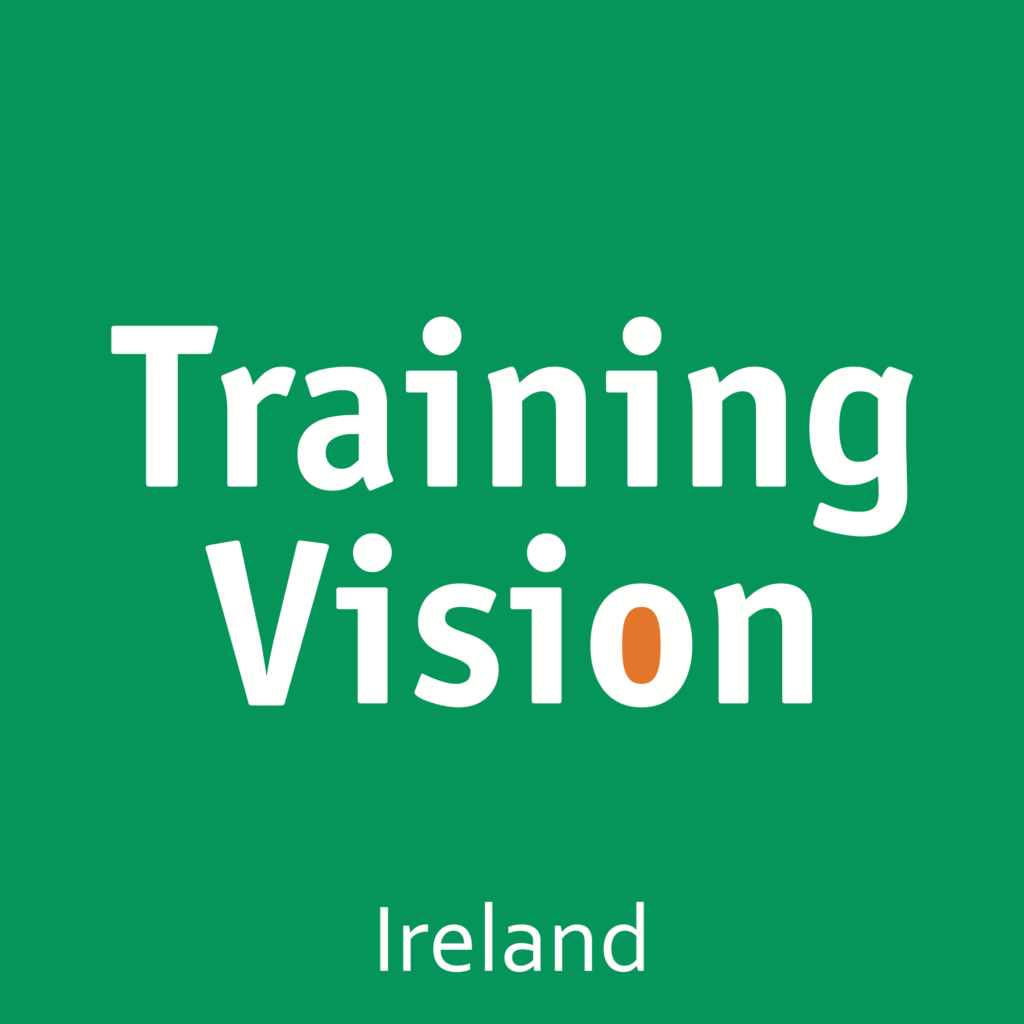
ETN Training Vision Ireland została założona w 2016 roku, aby pomóc zaspokoić rosnące zapotrzebowanie na szkolenia zawodowe i możliwości rozwoju kulturalnego w Irlandii.
ETN Training Vision Ireland z siedzibą w Cork organizuje i zarządza stażami i programami edukacyjnymi dla młodych studentów, kadry nauczycielskiej, młodych pracowników i organizacji z całej Europy. Training Vision jest członkiem „ETN Network” (Education and Training Network) z agencjami w Hiszpanii (Malaga), Bułgarii (Sofia), Włoszech (Rimini i Potenza), Wielkiej Brytanii (Portsmouth), Niemczech (Berlin), Portugalii (Lizbona) i Irlandii (Cork). W latach 2016, 2017, 2018 i 2019 ETN została nagrodzona jako zwycięzca w kategorii Dostawca Praktyk Zawodowych w konkursie Study Travel Star Awards w Londynie. To ważne uznanie dla profesjonalizmu, jakości i dbałości o wszystkie aspekty szkolenia w zakresie mobilności.
Training Vision Ireland specjalizuje się we wspieraniu rozwoju i uczenia się zarówno studentów, jak i dorosłych w szybko zmieniającym się świecie.
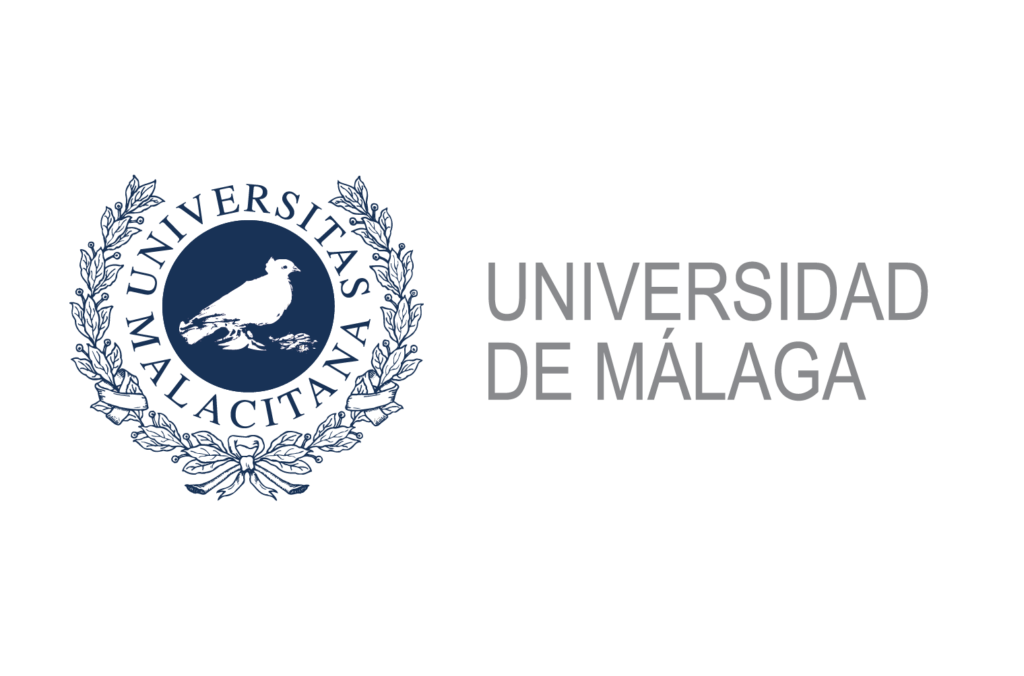
Uniwersytet w Maladze jest instytucją, która generuje i przekazuje wiedzę, świadcząc usługi szkolnictwa wyższego poprzez nauczanie, studia i badania. Jest to dynamiczny i innowacyjny uniwersytet, otwarty i partycypujący w służbie społeczeństwu, zintegrowany z Europejskim Obszarem Szkolnictwa Wyższego i Badań oraz powiązany ze światem biznesu i Andaluzyjskim Parkiem Technologicznym.
Uniwersytecki Instytut Badań w Inżynierii Mechatroniki i Systemów Cyberfizycznych (IMECH.UMA) został utworzony w celu promowania wysokiej jakości badań interdyscyplinarnych i ich transferu do społeczeństwa, a także promowania działań w zakresie studiów podyplomowych i doktoranckich oraz specjalistycznych szkoleń.
Laboratorium robotyki medycznej, które jest częścią konsorcjum, ma bogate doświadczenie w projektowaniu i rozwoju robotów chirurgicznych do użytku klinicznego oraz w opracowywaniu cyfrowych bliźniaków dla przemysłu, a także długą historię współpracy ze środowiskiem klinicznym i biznesowym.
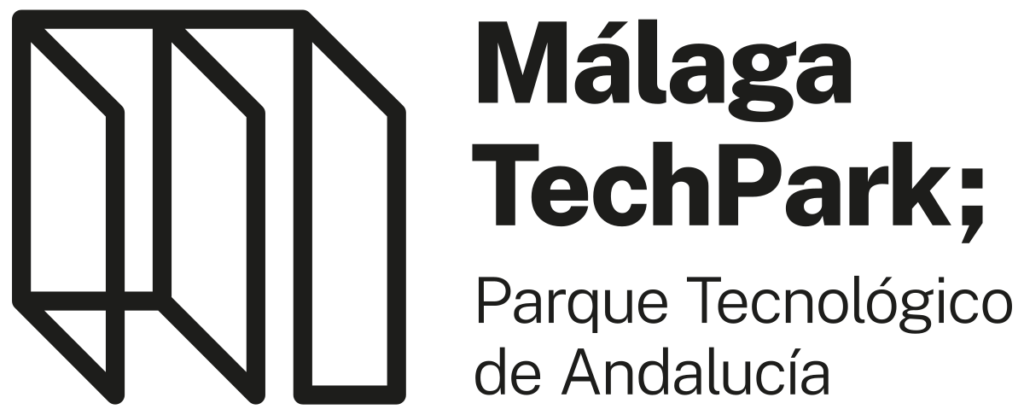
Málaga TechPark, założony w 1992 r. w Maladze (Hiszpania), stał się wielkim ośrodkiem przyciągającym innowacje w Andaluzji i Europie, a kluczem do jego rozwoju są zarówno technologia, jak i innowacje. Technopolis jest międzynarodowym punktem odniesienia, który można opisać jako zachęcający ośrodek przyciągający innowacyjne firmy i ekosystem dla zaawansowanych technologicznie firm i przedsiębiorców.
Málaga TechPark został specjalnie zaprojektowany, aby pomieścić wszystkie rodzaje podmiotów zajmujących się innowacjami. Technopolis jest międzynarodowym punktem odniesienia w zakresie parków naukowo-technologicznych, w których dominuje sektor technologii informacyjnych, zarówno w zakresie badań i rozwoju, jak i produkcji sprzętu i usług, z innowacyjnym i przyjaznym dla środowiska podejściem. Inne sektory obecne w parku to m.in. energetyka, inżynieria, gospodarka o obiegu zamkniętym, przemysł, rolno-spożywczy, biotechnologia. Z ponad 650 firmami i kilkoma kluczowymi podmiotami w Andaluzyjskim Systemie Wiedzy, takimi jak Uniwersytet i jego grupy badawcze, ponad 24 000 pracowników, obszar 200 hektarów z projektem rozbudowy w toku, PTA można uznać za jeden z głównych ośrodków innowacji i rozwoju gospodarczego w Andaluzji.
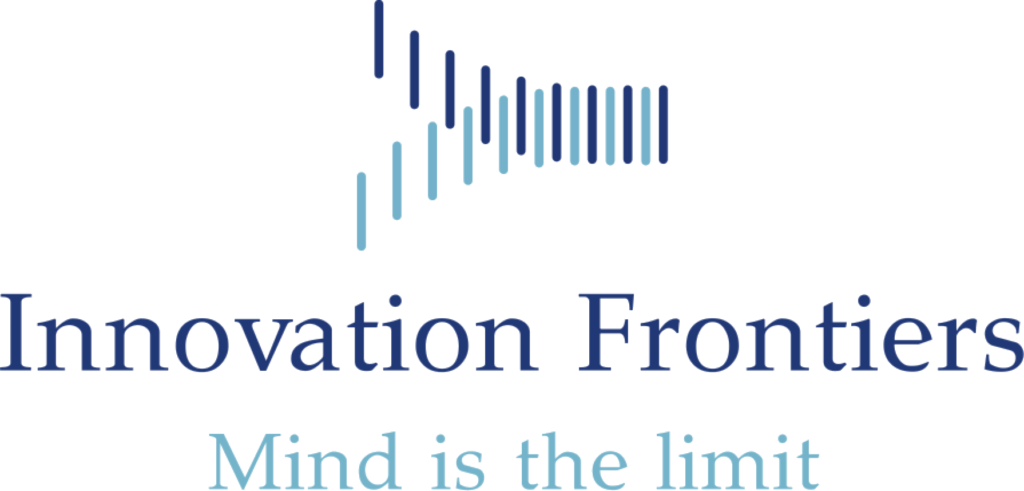
Innovation Frontiers IKE to innowacyjna firma zajmująca się technologiami edukacyjnymi i badaniami, która specjalizuje się w tworzeniu edukacyjnych, angażujących i rozrywkowych doświadczeń edukacyjnych, obejmujacych innowacje, kreatywność i grywalizację w celu zwiększenia przepływu dla uczniów. Nasza firma oferuje szerokie spektrum rozwiązań, w tym interaktywny e-learning na zamówienie, poważne gry, otwarte zasoby edukacyjne, symulacje szkoleniowe, animacje edukacyjne i nauczanie mobilne. Łączymy projektowanie gier, technologię gier, projektowanie instruktażowe i psychologię, aby opanować sztukę tworzenia gier edukacyjnych, symulacji i szkoleń. Innovation Frontiers IKE ma również bardzo duże doświadczenie w projektach badawczych (europejskich i międzynarodowych). Firma przestrzega bardzo rygorystycznych i kompletnych procesów zapewniania jakości w rozwoju swojego oprogramowania oraz w prowadzeniu europejskich i międzynarodowych projektów, w których bierze udział. Co więcej, firma integruje implikacje neuronauki edukacyjnej w klasie, aby poprawić efektywność uczenia się i nauczania.

Digital Smart to dostawca Vet zajmujący się profesjonalnymi szkoleniami w zakresie cyfrowej transformacji firm produkcyjnych. Działa w regionie Marche, a w celu szkolenia pracowników rozszerzyła swoją działalność na środkowe Włochy. Została założona przez konsultantów IT z ponad dwudziestoletnim doświadczeniem w pozyskiwaniu funduszy i budowaniu potencjału, tworzeniu firm i doradztwie zawodowym.
Digital Smart zarządza Akademią, w której odbywa się dwuletni wysokiej klasy kurs szkoleniowy zatytułowany „Inteligentna robotyka, cyfryzacja korporacyjna i projektowanie 3D” oraz organizuje niestandardowe kursy i akademie dostosowane do indywidualnych potrzeb, których celem jest szkolenie doskonałych techników, posiadających wiedzę i umiejętności w zakresie technologii wspomagających Przemysł 4.0.
W siedzibie Digital Smart znajdują się zaawansowane technologicznie sale szkoleniowe, laboratoria mechatroniczne, w tym Cyber-Fabryka Fizyczna Przemysłu 4.0.
Digital Smart jest również członkiem krajowego konsorcjum o nazwie „Italian Innovation for Work”, składającego się z instytucji VET i akademii szkoleniowych.
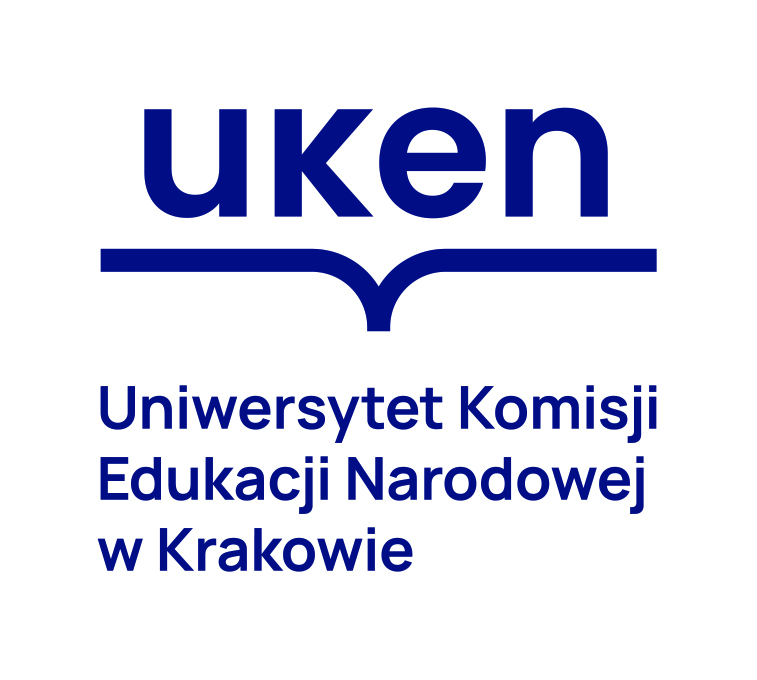
Uniwersytet Pedagogiczny im. Komisji Edukacji Narodowej w Krakowie od ponad 75 lat zajmuje czołowe miejsce wśród wyższych uczelni pedagogicznych w Polsce, jest również najstarszym Uniwersytetem Pedagogicznym w Polsce. Jest wyjątkowy ze względu na wysoki prestiż, profesjonalne kształcenie i nowoczesność.
Misja Uniwersytetu Pedagogicznego im. Komisji Edukacji Narodowej w Krakowie realizowana jest przez profesjonalną i doświadczoną kadrę dydaktyczną, która stosuje nowoczesne i aktualne treści nauczania. Wyraża się ona także poprzez prowadzenie badań naukowych, wytyczanie nowych kierunków rozwoju nauki, przekazywanie wiedzy oraz rozwijanie i wzbogacanie osobowości absolwentów poprzez kształcenie ich według najwyższych standardów europejskich.
Naszym studentom oferujemy najnowsze osiągnięcia w naukach humanistycznych, a także w naukach społecznych, pedagogicznych, przyrodniczych, technicznych i artystycznych. Nasza oferta edukacyjna umożliwia studentom aplikowanie na kilkadziesiąt kierunków studiów I stopnia (licencjackich) i II stopnia (magisterskich), a także na studia III stopnia (doktoranckich) oraz studia podyplomowe.

